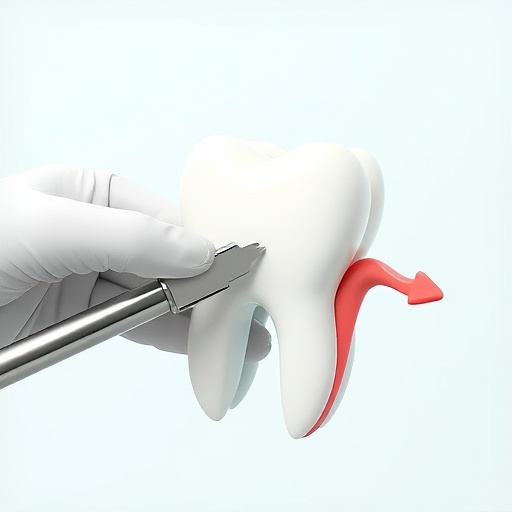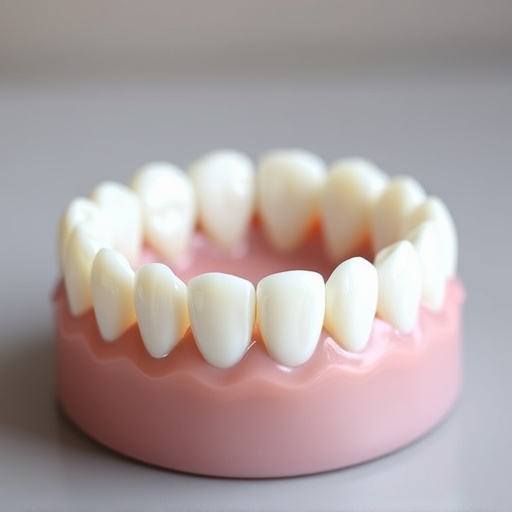Tooth sensitivity, driven by exposed dentin tubules, causes pain from specific food stimuli due to factors like enamel erosion, gum disease, receding gums, and dental defects. Early detection through regular dental exams enables simple treatments like fluoride toothpaste or fillings. Without care, sensitivity can progress to complex procedures. Effective management includes rigorous oral hygiene, limiting acidic foods, desensitizing products, and in-office procedures. Regular oral exams are crucial for early intervention, with bonding agents and sealants protecting exposed dentin. Untreated sensitivity leads to issues like decay and gum disease; regular tooth sensitivity treatment provides relief and prevents enamel erosion.
Tooth sensitivity can be a painful issue, but it’s not just a matter of discomfort—it could signal a bigger problem. Left untreated, tooth sensitivity can lead to tooth wear and erosion, compromising your oral health. This article delves into understanding the root causes of tooth sensitivity and explores effective treatment options. By addressing sensitivity, you’re not just easing pain; you’re preventing significant long-term damage, ensuring a healthier smile for years to come. Let’s explore the best strategies for managing and treating tooth sensitivity.
- Understanding Tooth Sensitivity and Its Causes
- Exploring Effective Treatment Options
- Long-term Benefits of Addressing Tooth Sensitivity
Understanding Tooth Sensitivity and Its Causes

Tooth sensitivity is a common dental issue characterized by discomfort or pain when consuming cold, hot, sweet, or acidic foods and beverages. It occurs due to the exposure of the tooth’s inner layers, specifically the dentin, which contains tiny tubules connecting to the tooth’s nerve. These tubules can become sensitive to stimuli, leading to a sharp or lingering sensation. Several factors contribute to tooth sensitivity, including tooth enamel erosion caused by acidic foods and drinks, periodontal gum disease, receding gums, and dental defects like cracks or chips. Regular oral exams with your general dentistry provider can help identify these issues early on, enabling prompt tooth sensitivity treatment.
Over time, if left untreated, sensitive teeth may require more extensive procedures such as dental fillings to repair damage or even lead to the need for more complex general dentistry interventions. Implementing a comprehensive oral care routine is essential to managing and preventing tooth sensitivity. This includes brushing twice daily with fluoride toothpaste, flossing regularly, and limiting exposure to acidic foods and drinks. Your dental care professional can also recommend specific tooth sensitivity treatments, such as desensitizing toothpastes or in-office procedures, to help alleviate discomfort and protect your teeth from further wear and erosion.
Exploring Effective Treatment Options

When it comes to exploring effective tooth sensitivity treatment options, there are several avenues to consider. One common approach involves using desensitizing dentifrices and mouthwashes that contain ingredients like potassium nitrate or strontium chloride. These products help block the transmission of sensory signals from the tooth’s surface to the nerve, thereby reducing discomfort. Additionally, bonding agents and sealants applied during a family dentistry visit can effectively protect exposed dentin, preventing further wear and erosion.
Regular routine oral exams play a crucial role in managing tooth sensitivity. Dentists can identify early signs of enamel wear or gum recession during these visits, allowing for prompt intervention. In some cases, more extensive procedures like tooth extractions might be necessary if severe damage has occurred. However, the goal is always to preserve as much natural tooth structure as possible, and modern treatments offer promising solutions for managing and reversing tooth sensitivity.
Long-term Benefits of Addressing Tooth Sensitivity

Addressing tooth sensitivity isn’t just about alleviating discomfort; it’s an investment in your long-term oral health. When left untreated, sensitive teeth can lead to more severe dental issues such as tooth decay and gum disease. Regular tooth sensitivity treatment not only provides immediate relief but also acts as a preventive measure against the progressive wear and erosion of tooth enamel. This is crucial as enamel, once worn down, cannot be regenerated naturally.
By adopting an proactive approach through comprehensive teeth cleaning and other targeted dental procedures like emergency dental care or dental fillings, you can maintain optimal oral health. These measures help to strengthen tooth structures, reduce sensitivity, and prevent the need for more extensive (and costly) treatments in the future.
Addressing tooth sensitivity through proper treatment not only provides relief from discomfort but also plays a pivotal role in preventing further dental wear and erosion. By understanding the causes and exploring effective solutions, individuals can take proactive steps to protect their teeth’s longevity. Investing in tooth sensitivity treatment is a smart move that offers long-term benefits, ensuring a healthier and more durable dental landscape.














